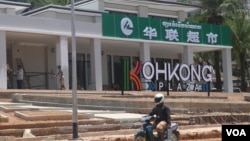The Koh Kong provincial government has created a 1,100-hectare “Tea Banh development area” and a “military vacation” area along the province’s coast, raising concerns among fishing communities over potential evictions.
The Koh Kong government on July 3 posted an article on its website announcing the creation of the “Samdech Pichey Sena Tea Banh development area” which will occupy 1,102 hectares of the province’s Chroy Pros commune. The demarcated area will also be used for “military vacations.”
Local officials have been unable to provide any details on the project. Koh Kong governor Mithona Phouthorng confirmed Tuesday that the province had decided to grant the land to the Defense Ministry but did not comment further.
Bun Loeut, former Koh Kong governor and currently a secretary of state at the Defense Ministry, will oversee the project. According to the July 3 article, he has met with provincial officials and now awaiting to get more information about the project. Bun Loeut said the site would be used to host guests of the Defense Ministry and it would not be used for profit. He said ministry officials had not visited the area but ensured that there are no disputes with local villagers.
“If it is relevant to [villagers’ land], the authorities will prepare a site [for relocation]. There seems to be no plan to evict people,” he told VOA Khmer.
“We will use some parts of the land to give to the people if this affects them. But we can’t give it to private individuals,” he added.
News of the development area has raised concerns among a fishing community that lives in Chroy Pros commune. Other Koh Kong fishing communities have faced evictions in recent years, such as in the case of the Chinese-owned Union Development Group’s tourism project in the province. The project placed a fifth of Cambodia’s coastline in private control.
“Now they will develop it for themselves, and not for us, frankly speaking,” said Tim Chhoeun, 66, a fisherperson who lives on a floating house in Chroy Pros commune.
“Here we can earn our daily living by catching crabs, snails, and fish. But if we live in the forests, what can we eat?” he said.
Pum Thoeun, the commune chief of Chroy Pros, said there were some 200 families among more than 500 living in floating houses near the coast. They will be asked to leave the fishing community, he said.
“We don’t force them. It is voluntary,” he said, adding that he is unsure if there is a relocation site or how much compensation will be offered to evicted villagers.
He also did not know the plans for the site, only that a “leisure place” will be created and it was unclear if the public would have access.
Koh Kong Deputy Governor Sok Sothy could not be reached for comment on Tuesday.
Thong Chandara, a rights monitor for ADHOC in Koh Kong, said people were concerned about a potential land dispute and the military’s history of using force and violence to resolve land disputes.
“The authorities should explain to people about the [new] area … and if in the future, the area will be barricaded and is only for military or high-ranking officials or the Chinese, the public will not be allowed to get in,” he said, referring to Chinese development projects.




